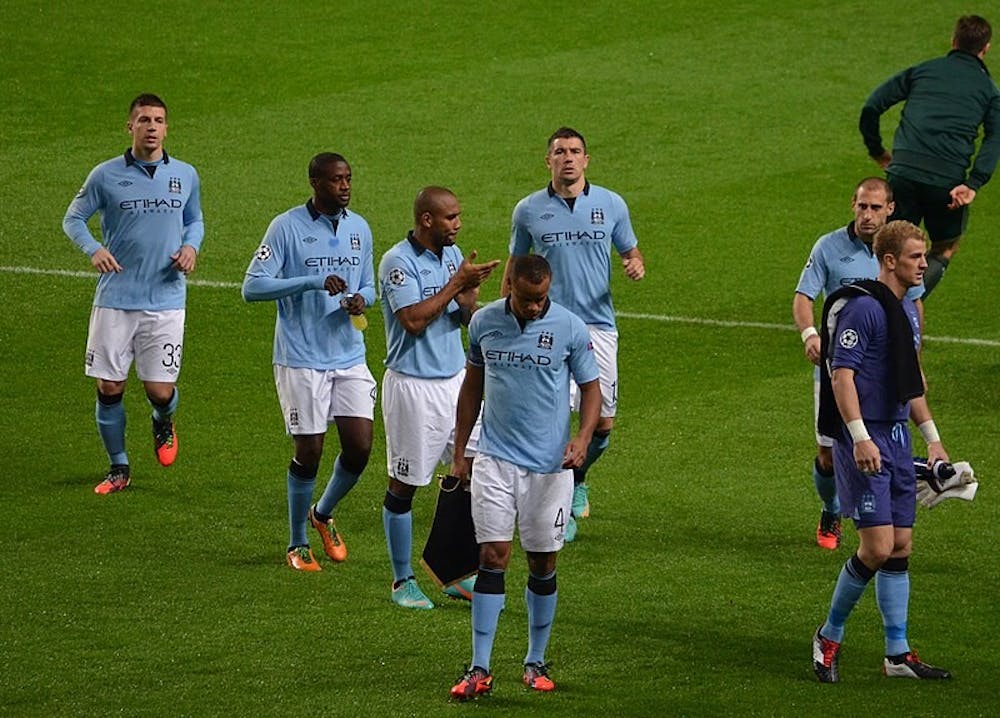
The soccer world was shaken by the leveling of a massive punishment against English titans Manchester City Football Club on Feb. 14.
The accusations against them, generally consisting of claims that City had committed significant financial improprieties and, in particular, arguing that the owners had illicitly funneled extra funds into their team through a shell sponsor, were unprecedented in the modern game.
There have been bans issued in European soccer before: For example, Chelsea Football Club were kept from bringing in any new players this past summer because of recruitment violations. That punishment was intended to be one full year long, but an appeal shortened it to only include the summer transfer window. (Ironically, Chelsea utilized their appealed freedom in the market this winter by buying nobody.)
Manchester City’s ban is unique, though. While teams like Chelsea and Futbol Club Barcelona have faced punishment in the past for the way that they recruited minors to join their respective teams, until now, nobody has ever faced such harsh ramifications for illegally paying for things. City’s breach of what is called “financial fair play” – more commonly referred to as FFP – earned them a fine of $32.5 million dollars and (theoretically) a two-year ban from the Union of European Football Associations (UEFA) Champions League.
In the past 10 years, City have been the most consistently dominant team in England, but that Champions League trophy has still managed to elude them. Importantly, participating in the Champions League makes a team like City around $100 million a year.
Now, FFP is too complicated to explain in full here, but essentially it requires a team to be profitable and not allow owners to just spend as much as they want, which seems to be exactly what the City owners have done. However, it’s important to note that all these punishments are yet to be enforced. Manchester City have known these punishments were coming for some time now. They have already appealed the ruling to the Court of Arbitration of Sport, the same people who cut short Chelsea’s transfer ban this past year.
City have also aggressively asserted their innocence on many occasions and on many platforms, as well as stated that they did in fact cooperate. Their chief executive Ferran Soriano has been quoted on the official Manchester City website saying that the club had “irrefutable evidence that the claims are not true.”
In reality, the truth seems more complicated. Manchester City is a part of a growing nationalization of European soccer. I don’t mean that the sport is growing in popularity, though it is. What I’m talking about is the fact that soccer teams are being bought by actual nations.
City, for example, is owned by Sheikh Mansour bin Zayed al Nahyan of Abu Dhabi. Though he himself is only worth a measly $22 billion, his family, – the royal family – have a combined worth of over $1 trillion. Oh, and his brother is the ruler of the United Arab Emirates. Paris Saint-Germain (PSG) Football Club, the biggest team in France, is owned by the country of Qatar. Before Qatar purchased PSG, five different teams had won the French soccer league in five years. Since that purchase, PSG have won the title in six out of the last seven.
Money is becoming more dominant in soccer than ever before. With the exception of the dreadfully run Manchester United Football Club and Arsenal Football Club, across Europe, the richest teams are the best teams. Liverpool Football Club’s recent success, for example, stems directly from American billionaire John Henry purchasing the team, and Chelsea was practically an unheard-of minnow before Russian billionaire Roman Abramovich bought them in the early 2000’s.
Every year Forbes or a similar news source publishes a list of the most expensive teams or the teams worth the most across Europe, and the list always coincides quite nicely with lists published by soccer journalists describing the best teams of the continent.
FFP was supposed to help with this, demanding that teams be profitable and not just a cash-dump for filthy owners. However, to say it has been ineffective would be far too kind to the institution. Take, for example, the time that PSG committed to spending over $400 million in one summer when they bought superstars Neymar and Kylian Mbappe. They were taken to court for their obvious crimes and they got away with it.
That’s the problem. City have known that these punishments were coming for years, since some of their documents were released by the now-infamous “Football Leaks” in 2018. Those document leaks accused many teams of breaking the rules, but none as much as City, whose chairman was allegedly quoted to have said that “he would rather spend 30 million pounds on the 50 best lawyers in the world to sue them for the next 10 years” instead of just following the rules.
City have been preparing for this for a long time, though. They’ve accused UEFA of unfairly and unevenly applying their rules since before those rules were officially applied against them, and they’re not wrong. UEFA has been unfair and inconsistent, and there’s no reason to assume that this situation won’t pan out the same way it always has.
Did City break the rules? Almost definitely. Considering the amount that they’ve spent on their team (their defense alone costs more than the defense budget of some small countries), it’s hard to imagine that there was no impropriety at all. That being said, this whole saga does seem destined to end in nothing. Money is taking over soccer, and just attacking Manchester City while leaving the rest of Europe’s super teams alone makes no sense when everyone is doing the same thing, just some to a smaller extent.
These problems need to be solved on a larger level, with a system that actually makes sense and with a governing body that’s committed to fully enforcing the rules they created. Until then, soccer fans just have to sit back and watch this sham justice process unfold.
At least we have some good soccer to watch in the meantime.





